How to calculate your score in the FCE exam
In my last post I told you everything you need to know before you decide to get ready for FCE. This article is going to explain to you in detail how the marking and scoring system in the FCE exam works. In addition to that, you will find out how to calculate your score on the Cambridge English Scale. Through this you’ll know what your level is in each of the different parts of Cambridge B2 First. So let’s start with a quick overview.
There are two different ‘scores’ in the FCE exam. The first one shows you the marks you get for each correct answer and the second one is your score on the Cambridge English Scale which we can calculate from your marks. Your score on the Cambridge English Scale is the one on your certificate and it shows you your level for each of the five exam parts. You reach B2 level with a score between 160-180.
First of all, let’s have a closer look at the two different scoring systems before we check out the Cambridge English Scale and the different parts of the exam. Once we’re done, you will understand how everything works and you will know how to calculate your score in Cambridge B2 First.
Why are there two different scores?
When Cambridge English started to use their new scale many students got confused. Suddenly, there were two different numbers to deal with instead of the old system where you had to get to 60% to pass the exam.
Let me tell you that you don’t have to panic. As you are going to see in this article, the new system is not really complicated. However, if you feel overwhelmed by the new system, you can still use the 60% rule as a nice guideline because it still works more or less.
The two different scores in the new system are your marks and your score on the Cambridge English Scale. Your marks are basically the points you get for each correct answer you give in the exam. Some correct answers can get you one mark, some others even two marks. With these marks you can now calculate your score on the Cambridge English Scale. The score is what you find on your certificate and it tells you your level in each exam paper.
The Cambridge English Scale explained
Cambridge English introduced their new scale in 2015 and they have used it ever since to report the result of all their exams to the candidates. Let’s see what it looks like:
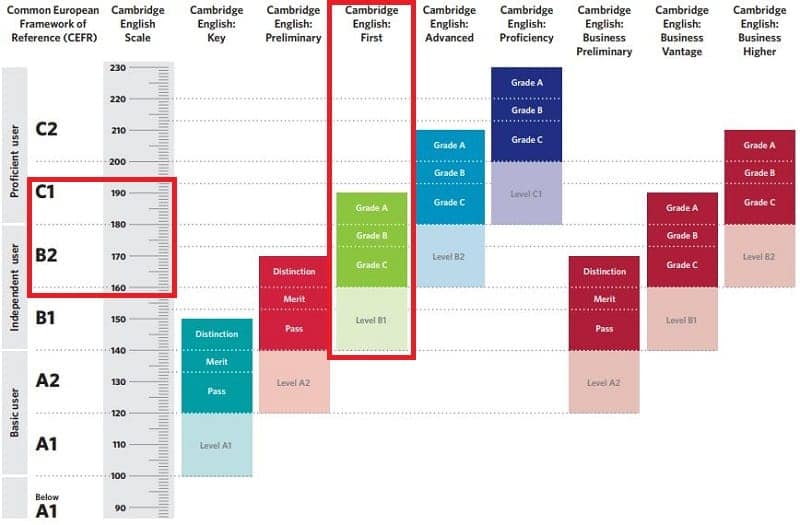
You can see all the different Cambridge English exams and where they fall on the scale. B2 First is right there in the middle. On the left there are the scores and levels and Grades C, B and A of of the FCE exam are between scores of 160-190 on the scale. The interesting part is that Grade A in FCE is the same as Grade C in the next higher CAE exam. This means that you can show in the FCE exam that your level is even higher than B2.
The great advantage of the new system is that it is very easy to see your level with your score instead of a percentage. A score of, for example, 179 in the FCE exam is the same as 179 in CAE and in both exams it means that your overall level is B2. In the old system the result in FCE would have been 79% whereas in CAE this student would have got 59%. Therefore, the Cambridge English scale makes it a lot easier to compare exam results even across different exams.
The results of the FCE exam are reported in a certificate that looks like the one below.
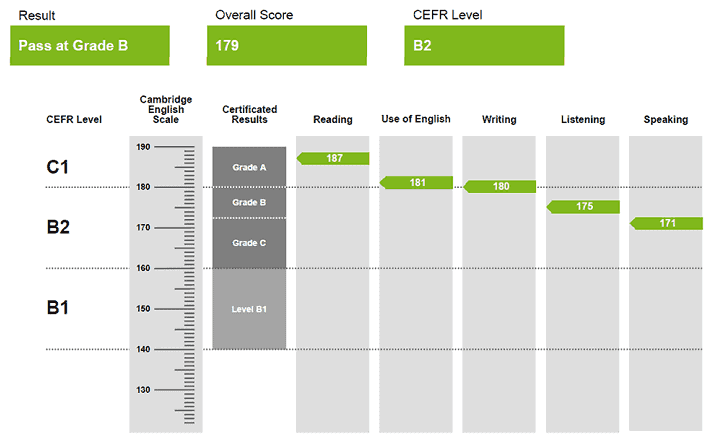
This student did quite well and passed at Grade B as the overall score of her exam is 179. Again, her score of 179 would have been 179 in CAE as well and in both exams the reported level is the same at B2.
The 5 different parts of the FCE exam
Apart from your overall result, score and level, the certificate shows you your scale score in each of the five parts tested in the exam. In the example above the student had very good results in reading, Use of English and writing while listening and speaking were a bit lower than the rest.
Now, I’m going to show you how you can calculate your score in each of the five parts. Of course, you need to know how many marks you’ve got in each part before you can get your scale score. Also, for speaking and writing it is a good idea to speak to your teacher and ask them what marks they would give you. Once you get your marks, you are ready to go.
1. Reading
In Cambridge B2 First you do Reading and Use of English together in one exam paper, but to calculate your score we have to break them up again. The exam paper has seven parts and for the reading portion we have to look just at parts 1, 5, 6 and 7.
- Reading counts 20% towards your overall result.
- Parts 1, 5, 6 and 7 of the Reading & Use of English paper count towards your reading score.
- For parts 1 and 7 you get 1 mark and for parts 5 and 6 you get 2 marks for each correct answer.
- There is a total of 42 possible marks in this part.
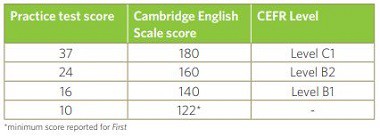
The image above shows you the number of marks on the left, the Cambridge English Scale scores in the middle and the level for these scores on the right. A score between 140-159 means that your reading level is B1, 160-179 represents B2 and scores above 180 is level C1. As you are going to see with the other parts, the Cambridge English Scale scores and CEFR levels are always the same, but the test scores (your marks in the exam) change from paper to paper.
2. Use of English
Because parts 1, 5, 6 and 7 make the reading portion of the exam, you have to calculate your score for Use of English from parts 2, 3 and 4.
- Use of English counts 20% towards your overall result.
- Parts 2, 3 and 4 of the Reading & Use of English paper count towards your Use of English score.
- For parts 2 and 3 you get 1 mark and for part 4 you get up to 2 marks for each correct answer.
- There is a total of 28 possible marks in this part.
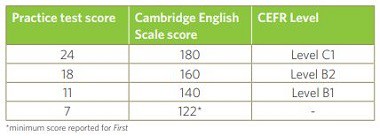
3. Listening
Listening is easy to calculate. You don’t have to break up the exam or worry about different marks in different parts. Everything is straightforward.
- Listening counts 20% towards your overall result.
- Every part of the listening exam counts.
- You get 1 mark for each correct answer.
- There is a total of 30 possible marks in this part.
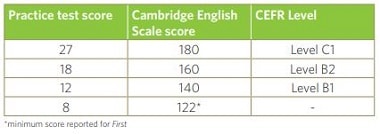
4. Writing
Calculating your score in the writing paper is a little bit more difficult than in the three previous parts. First of all, you have to write two texts so you have to take the sum of the two results and secondly, there are four different criteria to mark your writing. In total, that’s eight different marks to combine.
- Writing counts 20% towards your overall result.
- The two texts you write in the exam count in equal parts towards your result.
- You can get up to 5 marks for each of the following criteria:
- Content
- Communicative achievement
- Organisation
- Language
- With two texts and four marks for each text there is a total of 40 possible marks in the writing paper.
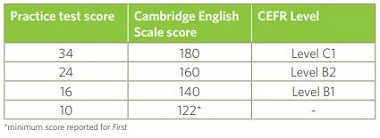
5. Speaking
I kept speaking until the end because it is even a little bit more complex than the writing paper. Again, there are five criteria and they count differently towards you total score. I’ll try to make this as short and simple as possible.
- Speaking counts 20% towards your overall result.
- The different criteria in the speaking exam count differently towards your total score.
- You can get up to 5 marks for each of the following criteria:
- Grammar & Vocabulary (Multiply your marks by 2, so there are 10 possible marks)
- Discourse management (Multiply your marks by 2, so there are 10 possible marks)
- Pronunciation (Multiply your marks by 2, so there are 10 possible marks)
- Interactive communication (Multiply your marks by 2, so there are 10 possible marks)
- Global (Multiply your marks by 4, so there are 20 possible marks)
- With five different criteria and different weight for each of them, there is a total of 60 possible marks.
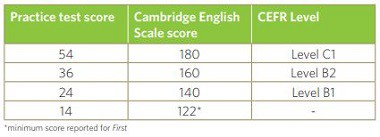
Can you fail the exam?
Strictly speaking, no. You can’t really fail the exam because you get a score on the Cambridge English Scale instead of a fail or pass grade. However, you want to get at least level B2 in the FCE exam so we can look at a score below 160 as a “fail”. Also, if you get less than 122 in any of the five parts, Cambridge won’t report the result in your certificate. So, even though you can’t technically fail, you need to reach a score of at least 160 to say that you “passed” the FCE exam.
Additional information
If you want to get some extra information on the Cambridge English scale, you can watch the video below. If you want more information on Cambridge B2 First, find out everything else you need to know here.
I hope that this article will help you to better understand the Cambridge English Scale and how to calculate your score.
Lots of love,
Teacher Phill 🙂







I can’t understand how to calculate cambridge english scale score in reading section. There are 126 possible marks. But this is too low mark.
1 and 7 parts overall equal to 24+30=54
5 and 6 parts overall equal to
36+36=72
72+54=126
This is so confusing
Please reply to me quickly.
Hi Madina,
I’m not sure how you get to those numbers, but if you look at the section on reading in my article again, you will see how it works.
https://teacherphill.com/fce-how-to-calculate-your-score/#The_5_different_parts_of_the_FCE_exam
Hi, I have seen a sample answer sheet, and was wondering what the 1, 0, and u are in the examiners’ box mean
Hi Leanne,
These are just for examiners’ use during the marking process. Nothing the candidates should worry about.